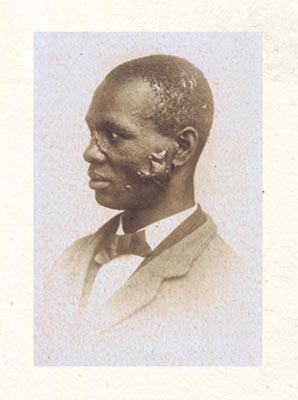
ABOUT EIGHTEEN MONTHS before the photograph was taken this patient had a severe attack of variola, which left considerable pitting of the face. About the time of leaving the hospital tumors appeared on either cheek, which have slowly increased in size. A small one was excised, but the growth reappeared almost as soon as the wound had healed. The lobe of the ear, which is sometimes the seat of cicatricial keloid, is unaffected in this case, although it has been pierced to hold a ring. The cause of keloid is unknown. Observation teaches that in the vast majority of cases it develops at some point where cutaneous injury has taken place. Negroes appear to be more frequently affected by keloid than white persons. Whether this is due to a peculiarity of the race or to the fact that their skins are more frequently pitted with variola, scarred by strumous abscesses, and disfigured by the lash, may be a question.

Transparent—that's what they are, white people.
You can tell from the way they look at you
they think you've been in brick or razor fights,
think old Africa just flares out on hot nights,
flaps her lips and calls you home, as once again
our thick and wooly blood takes hold, while we,
helpless before it, dream of jungles, nose-bones,
and human flesh. They stare but see you for what
you're not. Were I piebald, had claw hands,
a club foot, looked like the Turtle Boy,
or were anything like the usual, cute Negro freaks
at Barnam's or Worth's on the Bowery, tumbling
and laughing, trying to eat with knife and fork,
had I about me anything they could have dreamed
might ever have befallen them or fear could befall theirs,
though unborn, I'd at least had their useless sympathy,
unwanted but more tolerable than being seen naked,
grunting and jumping around a roasting man.
You did notice, I trust, that even Dr. Fox—
good enough to tell me he did not believe
the phrenological myths, and that what defined
was not the shape or size but what was in the head—
and I added, "Yes, and in the heart, too,"
which made him smile—you did notice that apart
from "Mrs. B., Scotch, widow," I am the only one
in his whole book identified by a single initial,
as if I had but a Christian name, no family, no surname,
as if I, were some old heathen's boy, I, who'd never
known the lash, never been a slave, having been born
here in New York, where emancipation came in 1827!
But even Dr. Fox, trained in careful and dermatological sight,
did not see me clear. He did notice one thing, though,
besides keloid and skin color; they all do, and it stops them,
holds them a moment, leaves them unsure, unnerved
by their lack of certainty, troubled—insecure, even—
disturbed by what so ordinary, so simple a thing
as a small gold earring could possibly mean.
